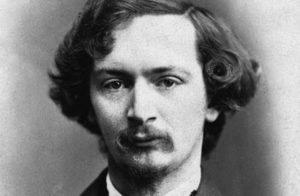 A few years ago, friends of mine were thrilled by the arrival of their first son. Their joy quickly turned to horror and grief a few hours later when doctors informed them that the baby had a fatal heart defect. A few hours later it was all over. My friend was discharged from the hospital the next day to go home with empty arms. Planning their son’s funeral service, my friends looked everywhere for a funeral poem for an infant. They finally settled on “A Baby’s Death” by Algernon Charles Swinburne.
A few years ago, friends of mine were thrilled by the arrival of their first son. Their joy quickly turned to horror and grief a few hours later when doctors informed them that the baby had a fatal heart defect. A few hours later it was all over. My friend was discharged from the hospital the next day to go home with empty arms. Planning their son’s funeral service, my friends looked everywhere for a funeral poem for an infant. They finally settled on “A Baby’s Death” by Algernon Charles Swinburne.
Swinburne was born in 1837, the oldest of six children. During his long and distinguished career, he wrote poems, plays, novels and contributed to the 11th edition of “Encyclopedia Britannica.” He was best known for his impressive vocabulary and his ability to create interesting meters and imaginative rhymes.
In Swinburne’s youth, his cohorts described him as “nervous” and “frail” but acknowledged that he possessed a passionate, if anxious, energy that fueled his writing. He sometimes liked to shock people by bragging about taking part in bizarre sexual behaviors.
When he was 42, Swinburne had a complete mental and physical breakdown. A long-term friend, Theodore Watts, took Swinburne under his wing and into his home. After he recovered, Swinburne lived a long, calm and socially respectable life. Watts later said he had “saved the man and killed the poet.”
There is little information available to provide context for this funeral poem for an infant. It appears that Swinburne wrote it to offer comfort and hope to a grieving friend. In “A Baby’s Death,” Swinburne acknowledges the grief parents feel at having their precious child die. It also, however, introduces the idea that the baby’s soul will live forever amongst the angels in paradise.
Swinburne writes in a series of three verses. Each set of verses contains one verse with four lines, one verse with three lines and a final verse with four lines. Each set focuses on one of the babies features such as his or her hands or feet. For instance:
“The little hands that never sought
Earth’s prizes, worthless all as sands,
What gifts has death, God’s servants brought
The little hands?
We ask: but love’s self silent stands
Love that lends eyes and wings to thought
To search where death’s dim heaven expands.
Ere this, perchance, though love know nought,
Flower’s fill them grown in lovelier lands
Where hands of guiding angels caught
The little hands.”
Swinburne’s final verse of this funeral poem for an infant is also very moving:
“But we saw born beneath some tender sphere
Michael, an angel and a little child,
Whose loss bows down to weep upon his bier
The song that smiled.”

Credit: poetryfoundation.org
When my friends held their baby’s funeral service, they changed the name from Michael to the name they had selected for their child.
Although Swinburne speaks of God and angels, this poem does not advocate any particular religion. My friends are both Wiccans, and they were enchanted by the image of their baby’s hands full of flowers.
The task of finding a funeral poem for an infant is not an easy one. If you are ever in this sad position, consider Algernon Charles Swinburne’s “A Baby’s Death.” Some of the Victorian-era expressions may seem a little stilted now, but overall the poem offers comfort and reassurance to grieving friends and family members.

 “A Baby’s Death” by Algernon Charles Swinburne
“A Baby’s Death” by Algernon Charles Swinburne


 “As Tears Go By” by Marianne Faithfull
“As Tears Go By” by Marianne Faithfull

 Funeral Favors Offer Visitors a Tangible Memento
Funeral Favors Offer Visitors a Tangible Memento















